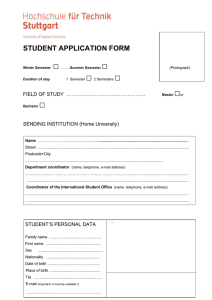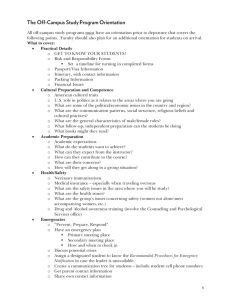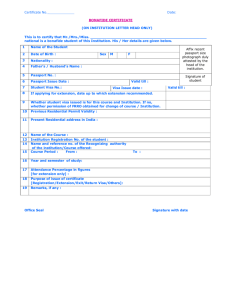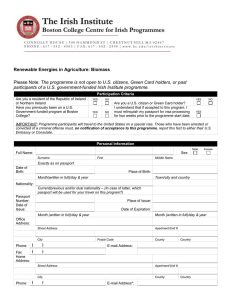TIPS TO STUDYING ABROAD IN GERMANY
advertisement
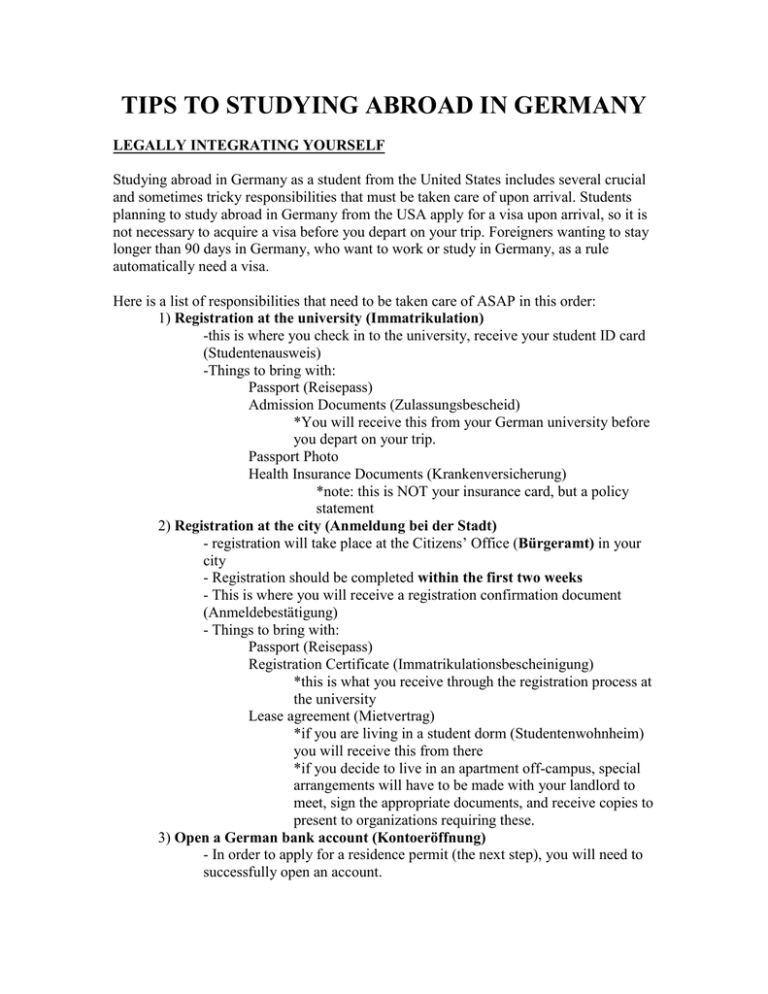
TIPS TO STUDYING ABROAD IN GERMANY LEGALLY INTEGRATING YOURSELF Studying abroad in Germany as a student from the United States includes several crucial and sometimes tricky responsibilities that must be taken care of upon arrival. Students planning to study abroad in Germany from the USA apply for a visa upon arrival, so it is not necessary to acquire a visa before you depart on your trip. Foreigners wanting to stay longer than 90 days in Germany, who want to work or study in Germany, as a rule automatically need a visa. Here is a list of responsibilities that need to be taken care of ASAP in this order: 1) Registration at the university (Immatrikulation) -this is where you check in to the university, receive your student ID card (Studentenausweis) -Things to bring with: Passport (Reisepass) Admission Documents (Zulassungsbescheid) *You will receive this from your German university before you depart on your trip. Passport Photo Health Insurance Documents (Krankenversicherung) *note: this is NOT your insurance card, but a policy statement 2) Registration at the city (Anmeldung bei der Stadt) - registration will take place at the Citizens’ Office (Bürgeramt) in your city - Registration should be completed within the first two weeks - This is where you will receive a registration confirmation document (Anmeldebestätigung) - Things to bring with: Passport (Reisepass) Registration Certificate (Immatrikulationsbescheinigung) *this is what you receive through the registration process at the university Lease agreement (Mietvertrag) *if you are living in a student dorm (Studentenwohnheim) you will receive this from there *if you decide to live in an apartment off-campus, special arrangements will have to be made with your landlord to meet, sign the appropriate documents, and receive copies to present to organizations requiring these. 3) Open a German bank account (Kontoeröffnung) - In order to apply for a residence permit (the next step), you will need to successfully open an account. - This can be a tricky step, because some banks require that you have residence permit beforehand. Deutsche Bank is one bank that allows you to take care of thing in the provided oder. - A minimum amount of funds must be available to cover living expenses. * At least 7.776,00 EUR for one year of study (two semesters) must be paid into an account in Germany, with the proviso that no more than 648,00 EUR can be drawn monthly. For one semester, roughly half that. 4) Apply for a Residence Permit for Study – your VISA (Aufenthaltsgenehmigung) - This will take place at the Foreigners’ Registration Office (Ausländerbehörde) - This is where you will receive your student visa, which costs 60 Euro (bring cash) - Registration should be taken care of within the first four weeks of stay - Things to bring with: Passport (Reisepass) Registration confirmation (Anmeldebestätigung) Registration Certificate (Immatrikulationsbescheinigung) Lease agreement (Mietvertrag) Health Insurance Documents (Krankenversicherung) Passport photo Proof of sufficient financial resources (Finanzierungserklärung) *A statement from your German bank. Cash to cover processing fees - Technically, you have 3 months before it is necessary that you carry a student visa, but the sooner the better in all of these steps to studying abroad. ENROLLMENT Enrollment for courses at the university will depend on the program with which you are involved. Students studying abroad in Germany from other European Union countries receive a lot of support in creating class schedules from the university at which they are applying. The same cannot be said for students from the United States. If possible, have a clear idea of which courses are available through the German university that will effectively transfer back to Kansas State. Enrollment doesn’t take place months in advance like it does in the US. Instead, students enroll in the week leading up to classes. So, extra effort must be taken on your part as an American student to seek out an appropriate advisor at the German university in order to effectively set up your schedule. ALTERNATIVE LIVING SITUATIONS If you are not interested in living in a student dorm during your time in Germany, extra steps can be taken to find an apartment within your university city. Several options are available: - A list of available sublease agreements can be provided to you by your contact person at the university. Contact information for students with available rooms will usually come in the form of an email address and an apartment address, so that you can contact the student(s) directly and find out in which part of town the available apartment is located. - Another, more adventurous route is to research for yourself what’s available through a network called WG-Gesucht (http://www.wg-gesucht.de/). This is an easily-navigated site where a large resource of available rooms within cities all across Germany can be located. The site is in German, but most German students speak English well enough for you to inquire about details on the renting agreement via email. THIS IS WHAT I WOULD RECOMMEND FOR STUDENTS WITH SOME LEVEL OF GERMAN PROFICIENCY. Through this site, you have the opportunity to live in the part of town that you desire with German roommates. Other sources of information include: http://www.zv.uni-leipzig.de/en/studium.html http://www.daad.de/deutschland/deutschland/leben-in-deutschland/06166.en.html
